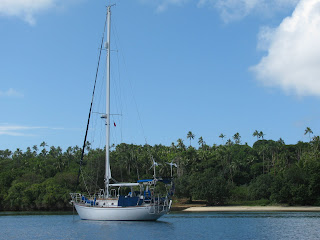
I was honored to have Brian and Claudia from California to visit Matamaka GPS a couple of weeks ago. They are involved in a two year journey around the South Pacific for their non-profit organization called Rising Tides. This NGO focuses on raising awareness on the affects of rising sea levels caused by global warming in the Pacific. Countries throughout the Pacific have already begun to move towards higher ground and have made strategic plans for massive evacuations in the future.
Furthermore, Brian and Claudia are avid divers. They are involved with CORAL WATCH. It is a coral monitoring organization based in Australia. Coral health readings are performed throughout various sites in the South Pacific and the data is submitted to the CORAL WATCH organization. CORAL WATCH is one of the many environmental initiatives funded by PROJECT A.W.A.R.E, which is also based in Australia. For more information, check out their website at: http://www.projectaware.org/. Brian and Claudia were nice enough to give us one coral health chart to assist us with our coral project and give us some great advice about our different projects.

 PHOTO: S/V Skylight with Brian and Claudia.
PHOTO: S/V Skylight with Brian and Claudia.Brian and Claudia are sailing on the beautiful S/V SKYLIGHT. The ship is well equipped with many types of “green” equipment. They use an ample amount of solar and wind power to operate the ship. Their travels can be tracked on their website at http://www.risingtides.org/. In addition, the website provides more information about their NGO and ways for YOU to get involved or sign up for the newsletter. If you would like to email them and ask them any questions, go for it: KG6CVO@winlink.org
They are off to FIJI until the cyclone season is over in the South Pacific and eventually finishing off in AUSTRALIA. Best of luck and safe travels to both of them from all of us here in Matamaka. I admire their work and great enthusiasm for adventure! MALO ‘AUPITO!
FUN FACTS:
* Scientists estimate that 25% of the world’s coral reefs are already dead. If current trends continue we may face the loss of this precious resource within the next 30-50 years.
* Coral reefs support 4,000 species of fish, 700 species of coral and thousands of plants and animals.
* Coral reefs are responsible for building the largest biological structure on earth—the Great Barrier Reef.











